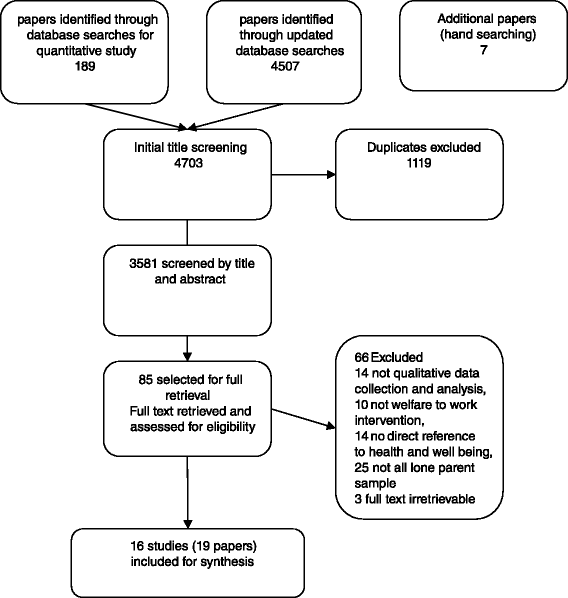Lone parents, health, wellbeing and welfare to work: a systematic review of qualitative studies
- PMID: 26911510
- PMCID: PMC4766630
- DOI: 10.1186/s12889-016-2880-9
Lone parents, health, wellbeing and welfare to work: a systematic review of qualitative studies
Abstract
Background: Lone parents and their children experience higher than average levels of adverse health and social outcomes, much of which are explained by high rates of poverty. Many high income countries have attempted to address high poverty rates by introducing employment requirements for lone parents in receipt of welfare benefits. However, there is evidence that employment may not reduce poverty or improve the health of lone parents and their children.
Methods: We conducted a systematic review of qualitative studies reporting lone parents' accounts of participation in welfare to work (WtW), to identify explanations and possible mechanisms for the impacts of WtW on health and wellbeing. Twenty one bibliographic databases were searched. Two reviewers independently screened references and assessed study quality. Studies from any high income country that met the criteria of focussing on lone parents, mandatory WtW interventions, and health or wellbeing were included. Thematic synthesis was used to investigate analytic themes between studies.
Results: Screening of the 4703 identified papers and quality assessment resulted in the inclusion of 16 qualitative studies of WtW in five high income countries, USA, Canada, UK, Australia, and New Zealand, covering a variety of welfare regimes. Our synthesis found that WtW requirements often conflicted with child care responsibilities. Available employment was often poorly paid and precarious. Adverse health impacts, such as increased stress, fatigue, and depression were commonly reported, though employment and appropriate training was linked to increased self-worth for some. WtW appeared to influence health through the pathways of conflict and control, analytical themes which emerged during synthesis. WtW reduced control over the nature of employment and care of children. Access to social support allowed some lone parents to manage the conflict associated with employment, and to increase control over their circumstances, with potentially beneficial health impacts.
Conclusion: WtW can result in increased conflict and reduced control, which may lead to negative impacts on mental health. Availability of social support may mediate the negative health impacts of WtW.
Similar articles
-
Welfare-to-work interventions and their effects on the mental and physical health of lone parents and their children.Cochrane Database Syst Rev. 2017 Aug 20;8(8):CD009820. doi: 10.1002/14651858.CD009820.pub2. Cochrane Database Syst Rev. 2017. Update in: Cochrane Database Syst Rev. 2018 Feb 26;2:CD009820. doi: 10.1002/14651858.CD009820.pub3. PMID: 28823111 Free PMC article. Updated.
-
Welfare-to-work interventions and their effects on the mental and physical health of lone parents and their children.Cochrane Database Syst Rev. 2018 Feb 26;2(2):CD009820. doi: 10.1002/14651858.CD009820.pub3. Cochrane Database Syst Rev. 2018. PMID: 29480555 Free PMC article.
-
Factors that influence parents' and informal caregivers' views and practices regarding routine childhood vaccination: a qualitative evidence synthesis.Cochrane Database Syst Rev. 2021 Oct 27;10(10):CD013265. doi: 10.1002/14651858.CD013265.pub2. Cochrane Database Syst Rev. 2021. PMID: 34706066 Free PMC article.
-
Participation in environmental enhancement and conservation activities for health and well-being in adults: a review of quantitative and qualitative evidence.Cochrane Database Syst Rev. 2016 May 21;2016(5):CD010351. doi: 10.1002/14651858.CD010351.pub2. Cochrane Database Syst Rev. 2016. PMID: 27207731 Free PMC article.
-
Family-centred interventions for Indigenous early childhood well-being by primary healthcare services.Cochrane Database Syst Rev. 2022 Dec 13;12(12):CD012463. doi: 10.1002/14651858.CD012463.pub2. Cochrane Database Syst Rev. 2022. PMID: 36511823 Free PMC article.
Cited by
-
Welfare-to-work interventions and their effects on the mental and physical health of lone parents and their children.Cochrane Database Syst Rev. 2017 Aug 20;8(8):CD009820. doi: 10.1002/14651858.CD009820.pub2. Cochrane Database Syst Rev. 2017. Update in: Cochrane Database Syst Rev. 2018 Feb 26;2:CD009820. doi: 10.1002/14651858.CD009820.pub3. PMID: 28823111 Free PMC article. Updated.
-
Welfare-to-work interventions and their effects on the mental and physical health of lone parents and their children.Cochrane Database Syst Rev. 2018 Feb 26;2(2):CD009820. doi: 10.1002/14651858.CD009820.pub3. Cochrane Database Syst Rev. 2018. PMID: 29480555 Free PMC article.
-
The Impact of Financial Hardship on Single Parents: An Exploration of the Journey From Social Distress to Seeking Help.J Fam Econ Issues. 2018;39(2):233-242. doi: 10.1007/s10834-017-9551-6. Epub 2017 Oct 17. J Fam Econ Issues. 2018. PMID: 29755247 Free PMC article.
-
Getting Better or Getting Worse? A Population-Based Study on Trends in Self-Rated Health among Single Mothers in Germany between 1994 and 2018.Int J Environ Res Public Health. 2022 Feb 26;19(5):2727. doi: 10.3390/ijerph19052727. Int J Environ Res Public Health. 2022. PMID: 35270418 Free PMC article.
-
Effects of restrictions to Income Support on health of lone mothers in the UK: a natural experiment study.Lancet Public Health. 2018 Jul;3(7):e333-e340. doi: 10.1016/S2468-2667(18)30109-9. Lancet Public Health. 2018. PMID: 29976327 Free PMC article.
References
-
- Targosz S, Bebbington P, Lewis G, Brugha T, Jenkins R, Farrell M, Meltzer H. Lone mothers, social exclusion and depression. Psychol Med. 2003;33(04):715–22. - PubMed
-
- Organisation for Economic Cooperation and Development. Doing Better for Children. Paris, France: OECD Publishing; 2009.
-
- Weitoft GR, Hjern A, Rosén M. School’s out! Why earlier among children of lone parents? Int J Soc Welf. 2004;13(2):134–144. doi: 10.1111/j.1369-6866.2004.00307.x. - DOI
-
- Maplethorpe N, Chanfreau J, Philo D, Tait C: Families with children in Britain: Findings from the 2008 Families and Children Study (FACS). UK: Department for Work and Pensions; 2010.
Publication types
MeSH terms
Grants and funding
LinkOut - more resources
Full Text Sources
Other Literature Sources
Miscellaneous


